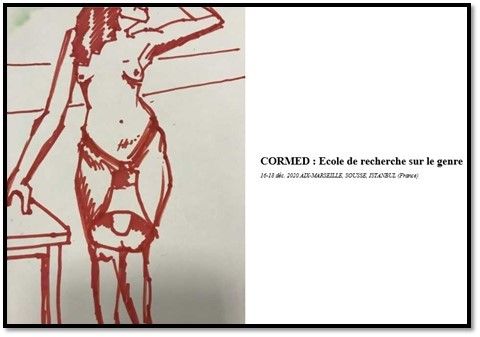
The Institute of "Mediterranean Societies in Transition" is associated with the organization of a research school on gender, from December 16th to 18th 2020. It will take place simultaneously in three countries: France - Turkey - Tunisia.
Scientific argument
While the vulnerability of our bodies and their dependence on the material and social environment is dramatically recalled in the Covid 19 pandemic, this appeal focuses on the place taken up by minorized bodies in times of crisis, past or present. Three modalities for the treatment of these bodies will be retained within the framework of this research school: surveillance, mobilization and exposure of bodies.
Monitored bodies : the surveillance of bodies has a long history dating back to the work of Michel Foucault, who explored their modern manufacture through imprisonment. After his pioneering works, the cultural continuity of "redress" in places of educational, disciplinary and political confinement from the colonial period to the time of totalitarianism has been grasped by historians. The confinement and surveillance of women, the invisibility of 'deviant' bodies, as a common and multi-secular feature of Mediterranean cultures was then explored by the human and social sciences and gave rise to multiple publications. Which archives and traces, by their presence or their lack, allow or not to recall, show, reflect on the continuation of this old tropism and estimate its contemporary resurgence, while measuring the unforeseen collateral effects of the pandemic?
Bodies mobilized : The mobilization of bodies responds to the contradictory demands of our time. Vehicles of a presence claimed by women and LGBTQI minorities, the multitude of bodies has been waging a deaf struggle and deploying its resistance to impose itself in the public space for the last two centuries. Bodies also bear witness today to all the forced displacements. They reveal the ruthless forces of globalization, social and political violence that accompany advanced capitalism and new forms of work. They are a source of hope, agitation and opposition to different assignments, just as they have become frontiers and objects of trafficking.
Exhibited bodies : For all that, the bodies finally circulate and in this liberating deconfinement, they become exemplary and a source of inspiration. The place of bodies as political and artistic subject objects responds to the tensions and contradictions of our time. Hidden, unveiled, marked, this play of bodies is exposed and its alternative and multiple models invade the canvas and the media. How to think about the distance and the proximity of bodies, how to construct bodies in the face of norms, how to make collective bodies that nourish political commitment and the change of representations, in this mixture of tragedy and the possible in the Mediterranean and in the world?
Partnership
The SoMuM institute is a partner of the research school, which involves: GENDERMED (MMSH-AMU), MUCEM, University of Galatasaray, University of Sousse, CNRS, Aix-Marseille University, LAMES, TELEMMe, SoMuM, Réseau universitaire et scientifique d'études sur le genre en Euro-Méditerranée, PIMo-COST CA 18140 Brussels, Films Femmes Méditerranée, French Institute of Turkey, French Institute of Anatolian Studies.
Practical modalities
The research school will take place on three university sites and one museum: Galatasaray, Sousse, Aix-Marseille University - MMSH and MUCEM. It is intended for students in Master 2, PhD and postdoctoral students.
Location
Galatasaray, Sousse, Aix-Marseille University - MMSH and MUCEM.
Dates
16-17-18 December 2020

